Analyzing Employment Law's Impact on Business & Governance Role
VerifiedAdded on 2023/06/10
|8
|3100
|438
Essay
AI Summary
This essay delves into the significant role of employment law in business organizations, highlighting its impact on maintaining equilibrium between employers and employees while safeguarding their respective rights. It discusses various acts and statutes, such as the Employment Rights Act 1996, the Equality Act 2010, the Minimum Wages Act 1998, and the Health and Security Act 1974, which outline the duties and responsibilities of both employers and employees. The essay further examines the concept of corporate governance, emphasizing its role in ensuring transparency, accountability, and ethical conduct within businesses, particularly in the context of listed companies in the UK, and concludes by underscoring the importance of adhering to employment laws and corporate governance principles to foster a positive and productive working environment.

Essay
Paraphrase This Document
Need a fresh take? Get an instant paraphrase of this document with our AI Paraphraser
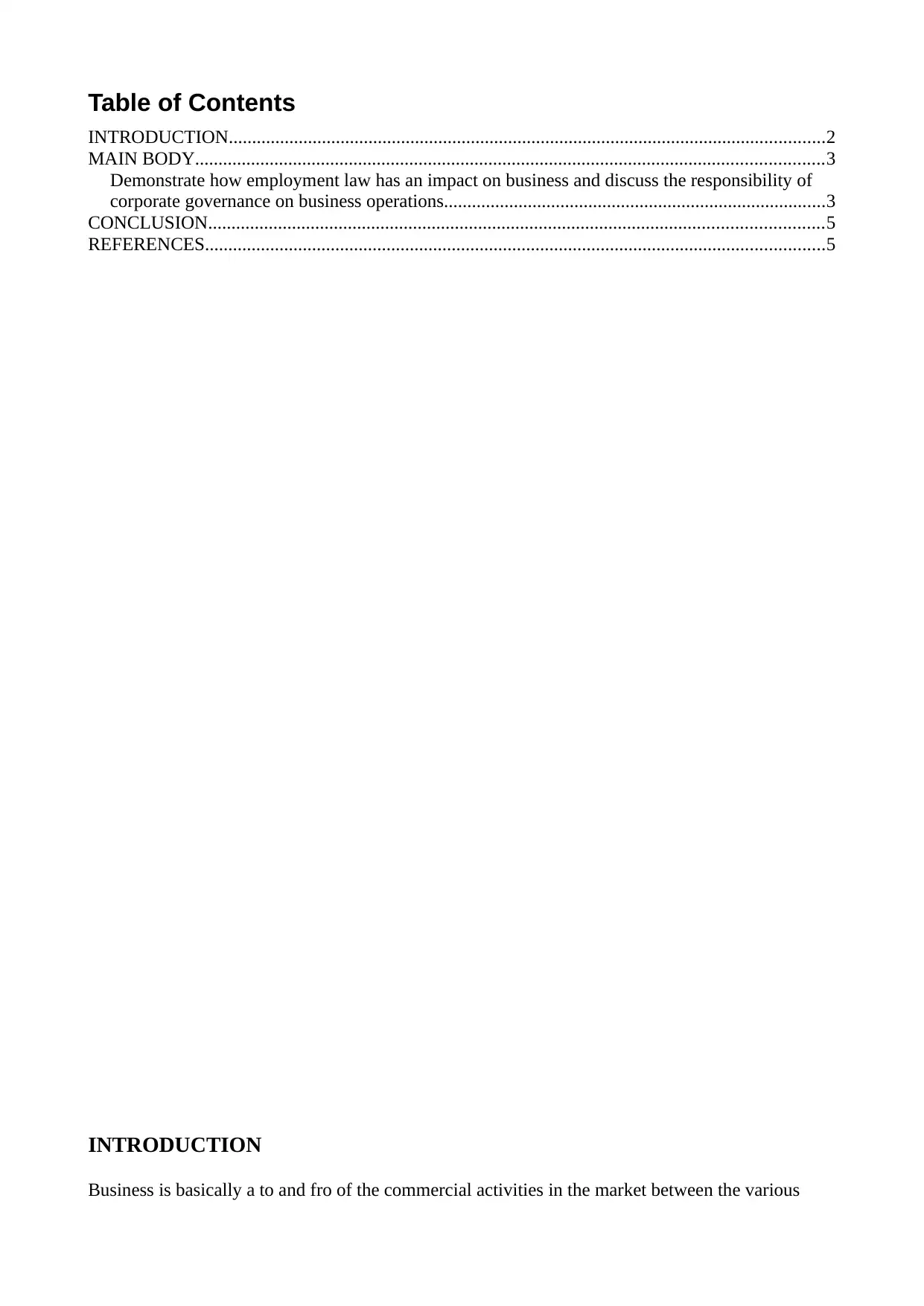
Table of Contents
INTRODUCTION................................................................................................................................2
MAIN BODY.......................................................................................................................................3
Demonstrate how employment law has an impact on business and discuss the responsibility of
corporate governance on business operations..................................................................................3
CONCLUSION....................................................................................................................................5
REFERENCES.....................................................................................................................................5
INTRODUCTION
Business is basically a to and fro of the commercial activities in the market between the various
INTRODUCTION................................................................................................................................2
MAIN BODY.......................................................................................................................................3
Demonstrate how employment law has an impact on business and discuss the responsibility of
corporate governance on business operations..................................................................................3
CONCLUSION....................................................................................................................................5
REFERENCES.....................................................................................................................................5
INTRODUCTION
Business is basically a to and fro of the commercial activities in the market between the various
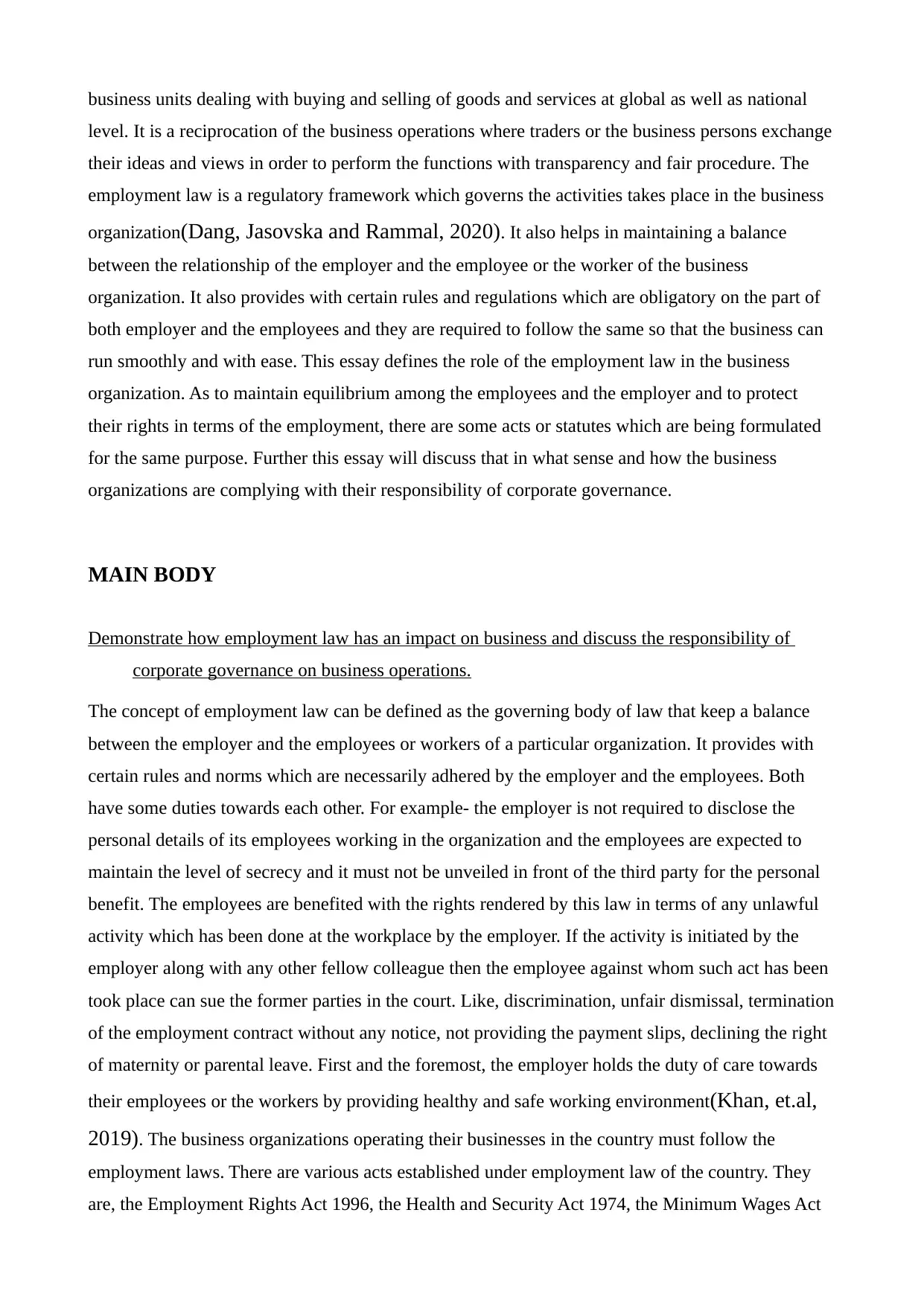
business units dealing with buying and selling of goods and services at global as well as national
level. It is a reciprocation of the business operations where traders or the business persons exchange
their ideas and views in order to perform the functions with transparency and fair procedure. The
employment law is a regulatory framework which governs the activities takes place in the business
organization(Dang, Jasovska and Rammal, 2020). It also helps in maintaining a balance
between the relationship of the employer and the employee or the worker of the business
organization. It also provides with certain rules and regulations which are obligatory on the part of
both employer and the employees and they are required to follow the same so that the business can
run smoothly and with ease. This essay defines the role of the employment law in the business
organization. As to maintain equilibrium among the employees and the employer and to protect
their rights in terms of the employment, there are some acts or statutes which are being formulated
for the same purpose. Further this essay will discuss that in what sense and how the business
organizations are complying with their responsibility of corporate governance.
MAIN BODY
Demonstrate how employment law has an impact on business and discuss the responsibility of
corporate governance on business operations.
The concept of employment law can be defined as the governing body of law that keep a balance
between the employer and the employees or workers of a particular organization. It provides with
certain rules and norms which are necessarily adhered by the employer and the employees. Both
have some duties towards each other. For example- the employer is not required to disclose the
personal details of its employees working in the organization and the employees are expected to
maintain the level of secrecy and it must not be unveiled in front of the third party for the personal
benefit. The employees are benefited with the rights rendered by this law in terms of any unlawful
activity which has been done at the workplace by the employer. If the activity is initiated by the
employer along with any other fellow colleague then the employee against whom such act has been
took place can sue the former parties in the court. Like, discrimination, unfair dismissal, termination
of the employment contract without any notice, not providing the payment slips, declining the right
of maternity or parental leave. First and the foremost, the employer holds the duty of care towards
their employees or the workers by providing healthy and safe working environment(Khan, et.al,
2019). The business organizations operating their businesses in the country must follow the
employment laws. There are various acts established under employment law of the country. They
are, the Employment Rights Act 1996, the Health and Security Act 1974, the Minimum Wages Act
level. It is a reciprocation of the business operations where traders or the business persons exchange
their ideas and views in order to perform the functions with transparency and fair procedure. The
employment law is a regulatory framework which governs the activities takes place in the business
organization(Dang, Jasovska and Rammal, 2020). It also helps in maintaining a balance
between the relationship of the employer and the employee or the worker of the business
organization. It also provides with certain rules and regulations which are obligatory on the part of
both employer and the employees and they are required to follow the same so that the business can
run smoothly and with ease. This essay defines the role of the employment law in the business
organization. As to maintain equilibrium among the employees and the employer and to protect
their rights in terms of the employment, there are some acts or statutes which are being formulated
for the same purpose. Further this essay will discuss that in what sense and how the business
organizations are complying with their responsibility of corporate governance.
MAIN BODY
Demonstrate how employment law has an impact on business and discuss the responsibility of
corporate governance on business operations.
The concept of employment law can be defined as the governing body of law that keep a balance
between the employer and the employees or workers of a particular organization. It provides with
certain rules and norms which are necessarily adhered by the employer and the employees. Both
have some duties towards each other. For example- the employer is not required to disclose the
personal details of its employees working in the organization and the employees are expected to
maintain the level of secrecy and it must not be unveiled in front of the third party for the personal
benefit. The employees are benefited with the rights rendered by this law in terms of any unlawful
activity which has been done at the workplace by the employer. If the activity is initiated by the
employer along with any other fellow colleague then the employee against whom such act has been
took place can sue the former parties in the court. Like, discrimination, unfair dismissal, termination
of the employment contract without any notice, not providing the payment slips, declining the right
of maternity or parental leave. First and the foremost, the employer holds the duty of care towards
their employees or the workers by providing healthy and safe working environment(Khan, et.al,
2019). The business organizations operating their businesses in the country must follow the
employment laws. There are various acts established under employment law of the country. They
are, the Employment Rights Act 1996, the Health and Security Act 1974, the Minimum Wages Act
⊘ This is a preview!⊘
Do you want full access?
Subscribe today to unlock all pages.

Trusted by 1+ million students worldwide
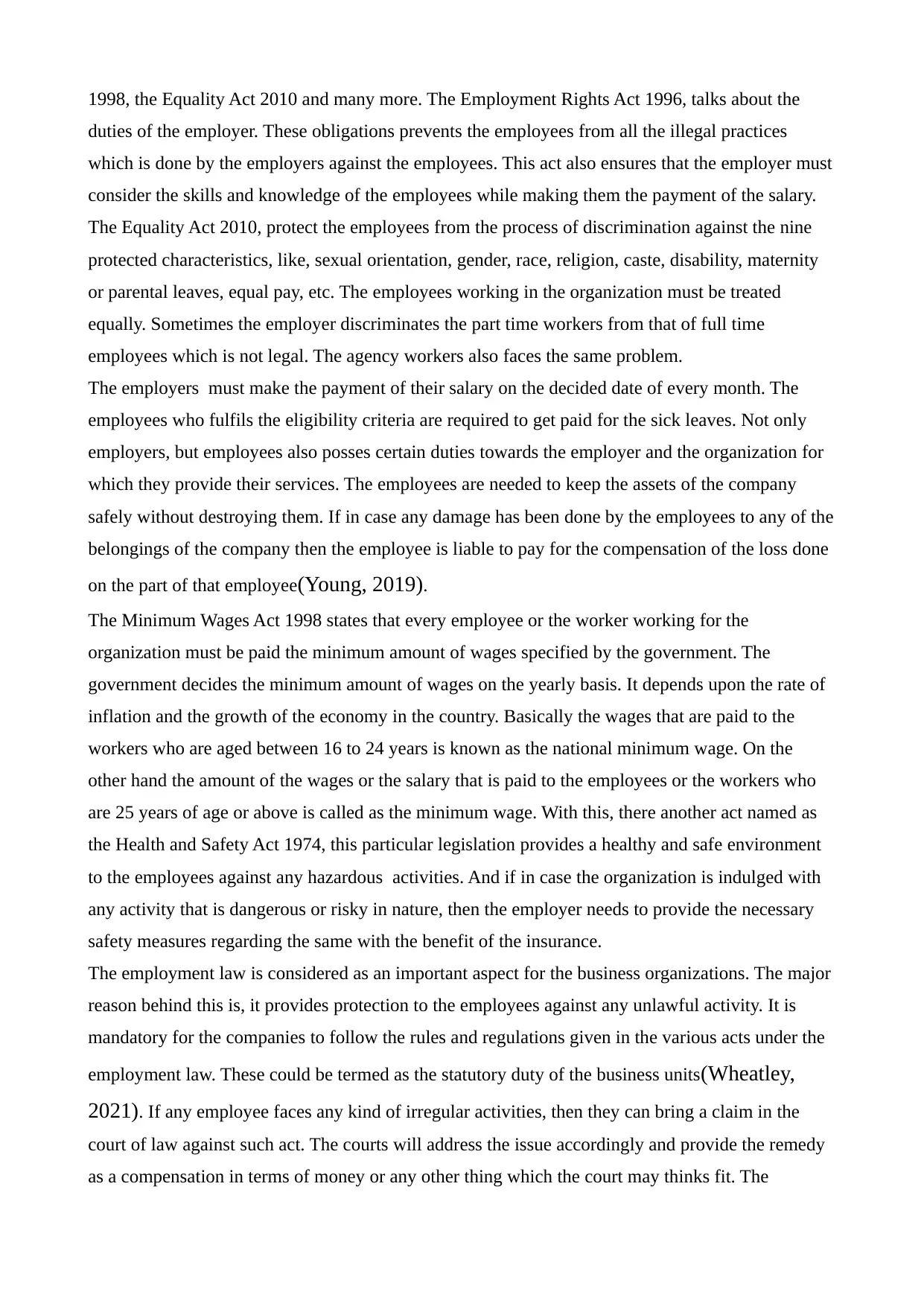
1998, the Equality Act 2010 and many more. The Employment Rights Act 1996, talks about the
duties of the employer. These obligations prevents the employees from all the illegal practices
which is done by the employers against the employees. This act also ensures that the employer must
consider the skills and knowledge of the employees while making them the payment of the salary.
The Equality Act 2010, protect the employees from the process of discrimination against the nine
protected characteristics, like, sexual orientation, gender, race, religion, caste, disability, maternity
or parental leaves, equal pay, etc. The employees working in the organization must be treated
equally. Sometimes the employer discriminates the part time workers from that of full time
employees which is not legal. The agency workers also faces the same problem.
The employers must make the payment of their salary on the decided date of every month. The
employees who fulfils the eligibility criteria are required to get paid for the sick leaves. Not only
employers, but employees also posses certain duties towards the employer and the organization for
which they provide their services. The employees are needed to keep the assets of the company
safely without destroying them. If in case any damage has been done by the employees to any of the
belongings of the company then the employee is liable to pay for the compensation of the loss done
on the part of that employee(Young, 2019).
The Minimum Wages Act 1998 states that every employee or the worker working for the
organization must be paid the minimum amount of wages specified by the government. The
government decides the minimum amount of wages on the yearly basis. It depends upon the rate of
inflation and the growth of the economy in the country. Basically the wages that are paid to the
workers who are aged between 16 to 24 years is known as the national minimum wage. On the
other hand the amount of the wages or the salary that is paid to the employees or the workers who
are 25 years of age or above is called as the minimum wage. With this, there another act named as
the Health and Safety Act 1974, this particular legislation provides a healthy and safe environment
to the employees against any hazardous activities. And if in case the organization is indulged with
any activity that is dangerous or risky in nature, then the employer needs to provide the necessary
safety measures regarding the same with the benefit of the insurance.
The employment law is considered as an important aspect for the business organizations. The major
reason behind this is, it provides protection to the employees against any unlawful activity. It is
mandatory for the companies to follow the rules and regulations given in the various acts under the
employment law. These could be termed as the statutory duty of the business units(Wheatley,
2021). If any employee faces any kind of irregular activities, then they can bring a claim in the
court of law against such act. The courts will address the issue accordingly and provide the remedy
as a compensation in terms of money or any other thing which the court may thinks fit. The
duties of the employer. These obligations prevents the employees from all the illegal practices
which is done by the employers against the employees. This act also ensures that the employer must
consider the skills and knowledge of the employees while making them the payment of the salary.
The Equality Act 2010, protect the employees from the process of discrimination against the nine
protected characteristics, like, sexual orientation, gender, race, religion, caste, disability, maternity
or parental leaves, equal pay, etc. The employees working in the organization must be treated
equally. Sometimes the employer discriminates the part time workers from that of full time
employees which is not legal. The agency workers also faces the same problem.
The employers must make the payment of their salary on the decided date of every month. The
employees who fulfils the eligibility criteria are required to get paid for the sick leaves. Not only
employers, but employees also posses certain duties towards the employer and the organization for
which they provide their services. The employees are needed to keep the assets of the company
safely without destroying them. If in case any damage has been done by the employees to any of the
belongings of the company then the employee is liable to pay for the compensation of the loss done
on the part of that employee(Young, 2019).
The Minimum Wages Act 1998 states that every employee or the worker working for the
organization must be paid the minimum amount of wages specified by the government. The
government decides the minimum amount of wages on the yearly basis. It depends upon the rate of
inflation and the growth of the economy in the country. Basically the wages that are paid to the
workers who are aged between 16 to 24 years is known as the national minimum wage. On the
other hand the amount of the wages or the salary that is paid to the employees or the workers who
are 25 years of age or above is called as the minimum wage. With this, there another act named as
the Health and Safety Act 1974, this particular legislation provides a healthy and safe environment
to the employees against any hazardous activities. And if in case the organization is indulged with
any activity that is dangerous or risky in nature, then the employer needs to provide the necessary
safety measures regarding the same with the benefit of the insurance.
The employment law is considered as an important aspect for the business organizations. The major
reason behind this is, it provides protection to the employees against any unlawful activity. It is
mandatory for the companies to follow the rules and regulations given in the various acts under the
employment law. These could be termed as the statutory duty of the business units(Wheatley,
2021). If any employee faces any kind of irregular activities, then they can bring a claim in the
court of law against such act. The courts will address the issue accordingly and provide the remedy
as a compensation in terms of money or any other thing which the court may thinks fit. The
Paraphrase This Document
Need a fresh take? Get an instant paraphrase of this document with our AI Paraphraser
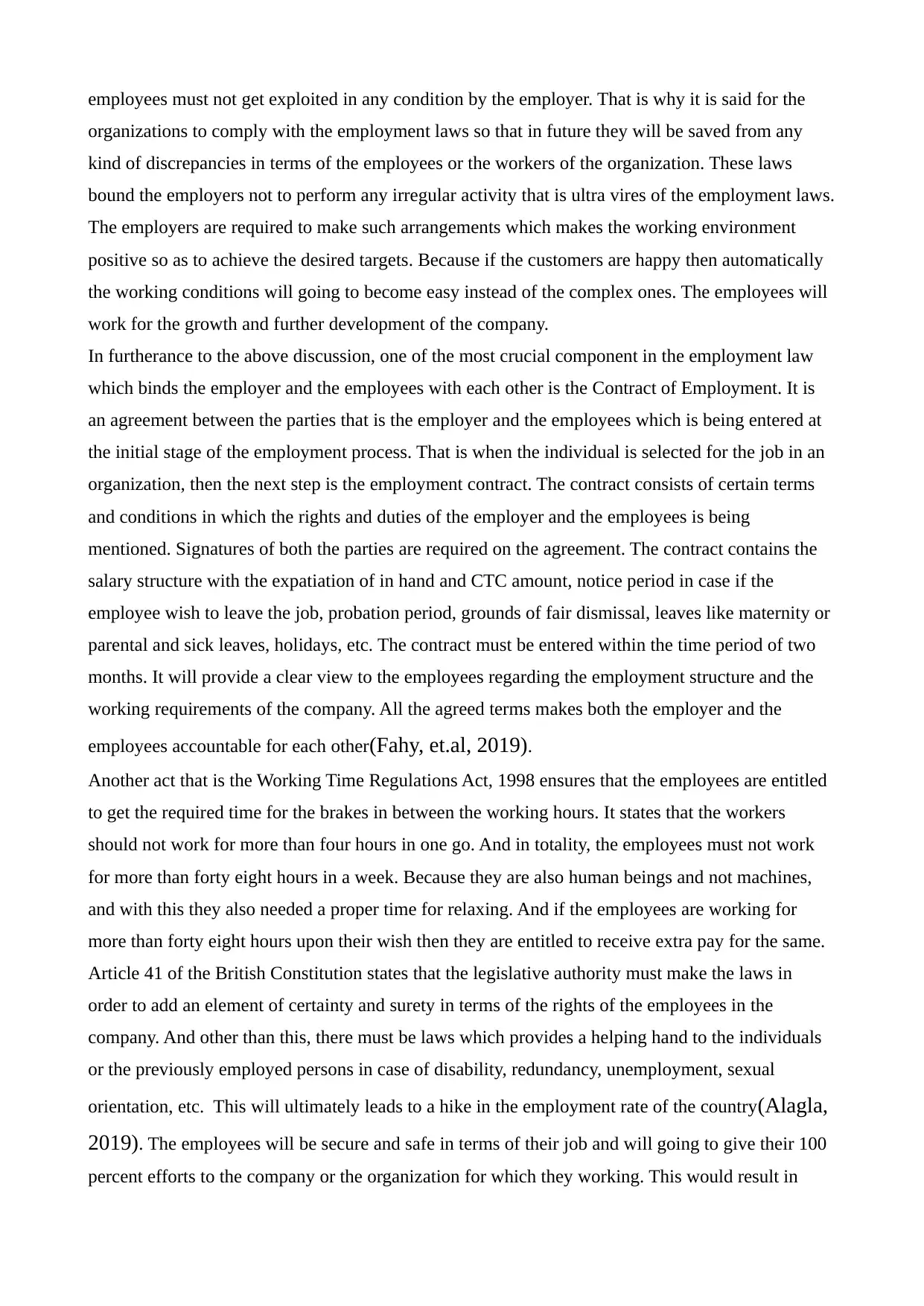
employees must not get exploited in any condition by the employer. That is why it is said for the
organizations to comply with the employment laws so that in future they will be saved from any
kind of discrepancies in terms of the employees or the workers of the organization. These laws
bound the employers not to perform any irregular activity that is ultra vires of the employment laws.
The employers are required to make such arrangements which makes the working environment
positive so as to achieve the desired targets. Because if the customers are happy then automatically
the working conditions will going to become easy instead of the complex ones. The employees will
work for the growth and further development of the company.
In furtherance to the above discussion, one of the most crucial component in the employment law
which binds the employer and the employees with each other is the Contract of Employment. It is
an agreement between the parties that is the employer and the employees which is being entered at
the initial stage of the employment process. That is when the individual is selected for the job in an
organization, then the next step is the employment contract. The contract consists of certain terms
and conditions in which the rights and duties of the employer and the employees is being
mentioned. Signatures of both the parties are required on the agreement. The contract contains the
salary structure with the expatiation of in hand and CTC amount, notice period in case if the
employee wish to leave the job, probation period, grounds of fair dismissal, leaves like maternity or
parental and sick leaves, holidays, etc. The contract must be entered within the time period of two
months. It will provide a clear view to the employees regarding the employment structure and the
working requirements of the company. All the agreed terms makes both the employer and the
employees accountable for each other(Fahy, et.al, 2019).
Another act that is the Working Time Regulations Act, 1998 ensures that the employees are entitled
to get the required time for the brakes in between the working hours. It states that the workers
should not work for more than four hours in one go. And in totality, the employees must not work
for more than forty eight hours in a week. Because they are also human beings and not machines,
and with this they also needed a proper time for relaxing. And if the employees are working for
more than forty eight hours upon their wish then they are entitled to receive extra pay for the same.
Article 41 of the British Constitution states that the legislative authority must make the laws in
order to add an element of certainty and surety in terms of the rights of the employees in the
company. And other than this, there must be laws which provides a helping hand to the individuals
or the previously employed persons in case of disability, redundancy, unemployment, sexual
orientation, etc. This will ultimately leads to a hike in the employment rate of the country(Alagla,
2019). The employees will be secure and safe in terms of their job and will going to give their 100
percent efforts to the company or the organization for which they working. This would result in
organizations to comply with the employment laws so that in future they will be saved from any
kind of discrepancies in terms of the employees or the workers of the organization. These laws
bound the employers not to perform any irregular activity that is ultra vires of the employment laws.
The employers are required to make such arrangements which makes the working environment
positive so as to achieve the desired targets. Because if the customers are happy then automatically
the working conditions will going to become easy instead of the complex ones. The employees will
work for the growth and further development of the company.
In furtherance to the above discussion, one of the most crucial component in the employment law
which binds the employer and the employees with each other is the Contract of Employment. It is
an agreement between the parties that is the employer and the employees which is being entered at
the initial stage of the employment process. That is when the individual is selected for the job in an
organization, then the next step is the employment contract. The contract consists of certain terms
and conditions in which the rights and duties of the employer and the employees is being
mentioned. Signatures of both the parties are required on the agreement. The contract contains the
salary structure with the expatiation of in hand and CTC amount, notice period in case if the
employee wish to leave the job, probation period, grounds of fair dismissal, leaves like maternity or
parental and sick leaves, holidays, etc. The contract must be entered within the time period of two
months. It will provide a clear view to the employees regarding the employment structure and the
working requirements of the company. All the agreed terms makes both the employer and the
employees accountable for each other(Fahy, et.al, 2019).
Another act that is the Working Time Regulations Act, 1998 ensures that the employees are entitled
to get the required time for the brakes in between the working hours. It states that the workers
should not work for more than four hours in one go. And in totality, the employees must not work
for more than forty eight hours in a week. Because they are also human beings and not machines,
and with this they also needed a proper time for relaxing. And if the employees are working for
more than forty eight hours upon their wish then they are entitled to receive extra pay for the same.
Article 41 of the British Constitution states that the legislative authority must make the laws in
order to add an element of certainty and surety in terms of the rights of the employees in the
company. And other than this, there must be laws which provides a helping hand to the individuals
or the previously employed persons in case of disability, redundancy, unemployment, sexual
orientation, etc. This will ultimately leads to a hike in the employment rate of the country(Alagla,
2019). The employees will be secure and safe in terms of their job and will going to give their 100
percent efforts to the company or the organization for which they working. This would result in
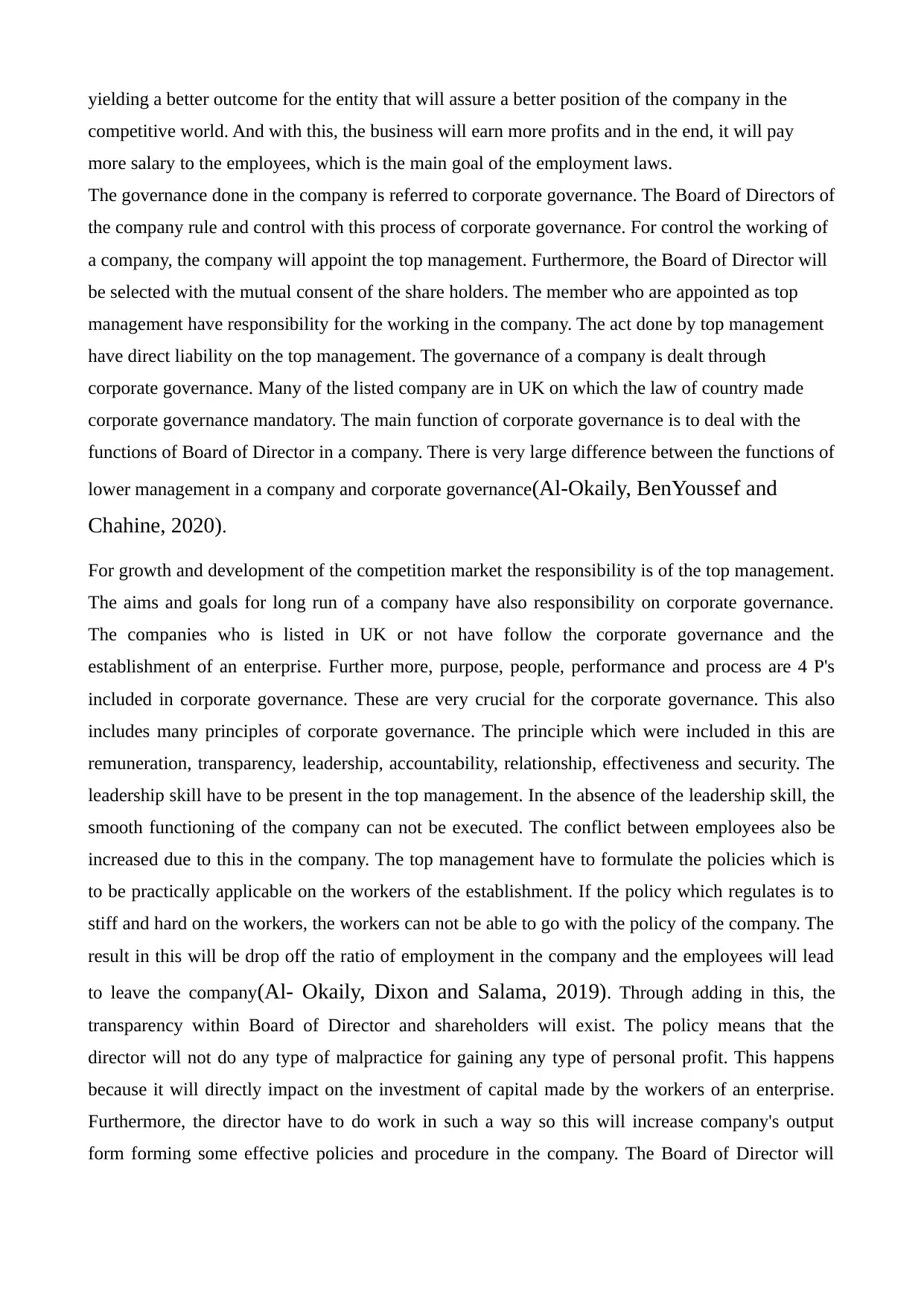
yielding a better outcome for the entity that will assure a better position of the company in the
competitive world. And with this, the business will earn more profits and in the end, it will pay
more salary to the employees, which is the main goal of the employment laws.
The governance done in the company is referred to corporate governance. The Board of Directors of
the company rule and control with this process of corporate governance. For control the working of
a company, the company will appoint the top management. Furthermore, the Board of Director will
be selected with the mutual consent of the share holders. The member who are appointed as top
management have responsibility for the working in the company. The act done by top management
have direct liability on the top management. The governance of a company is dealt through
corporate governance. Many of the listed company are in UK on which the law of country made
corporate governance mandatory. The main function of corporate governance is to deal with the
functions of Board of Director in a company. There is very large difference between the functions of
lower management in a company and corporate governance(Al‐Okaily, BenYoussef and
Chahine, 2020).
For growth and development of the competition market the responsibility is of the top management.
The aims and goals for long run of a company have also responsibility on corporate governance.
The companies who is listed in UK or not have follow the corporate governance and the
establishment of an enterprise. Further more, purpose, people, performance and process are 4 P's
included in corporate governance. These are very crucial for the corporate governance. This also
includes many principles of corporate governance. The principle which were included in this are
remuneration, transparency, leadership, accountability, relationship, effectiveness and security. The
leadership skill have to be present in the top management. In the absence of the leadership skill, the
smooth functioning of the company can not be executed. The conflict between employees also be
increased due to this in the company. The top management have to formulate the policies which is
to be practically applicable on the workers of the establishment. If the policy which regulates is to
stiff and hard on the workers, the workers can not be able to go with the policy of the company. The
result in this will be drop off the ratio of employment in the company and the employees will lead
to leave the company(Al- Okaily, Dixon and Salama, 2019). Through adding in this, the
transparency within Board of Director and shareholders will exist. The policy means that the
director will not do any type of malpractice for gaining any type of personal profit. This happens
because it will directly impact on the investment of capital made by the workers of an enterprise.
Furthermore, the director have to do work in such a way so this will increase company's output
form forming some effective policies and procedure in the company. The Board of Director will
competitive world. And with this, the business will earn more profits and in the end, it will pay
more salary to the employees, which is the main goal of the employment laws.
The governance done in the company is referred to corporate governance. The Board of Directors of
the company rule and control with this process of corporate governance. For control the working of
a company, the company will appoint the top management. Furthermore, the Board of Director will
be selected with the mutual consent of the share holders. The member who are appointed as top
management have responsibility for the working in the company. The act done by top management
have direct liability on the top management. The governance of a company is dealt through
corporate governance. Many of the listed company are in UK on which the law of country made
corporate governance mandatory. The main function of corporate governance is to deal with the
functions of Board of Director in a company. There is very large difference between the functions of
lower management in a company and corporate governance(Al‐Okaily, BenYoussef and
Chahine, 2020).
For growth and development of the competition market the responsibility is of the top management.
The aims and goals for long run of a company have also responsibility on corporate governance.
The companies who is listed in UK or not have follow the corporate governance and the
establishment of an enterprise. Further more, purpose, people, performance and process are 4 P's
included in corporate governance. These are very crucial for the corporate governance. This also
includes many principles of corporate governance. The principle which were included in this are
remuneration, transparency, leadership, accountability, relationship, effectiveness and security. The
leadership skill have to be present in the top management. In the absence of the leadership skill, the
smooth functioning of the company can not be executed. The conflict between employees also be
increased due to this in the company. The top management have to formulate the policies which is
to be practically applicable on the workers of the establishment. If the policy which regulates is to
stiff and hard on the workers, the workers can not be able to go with the policy of the company. The
result in this will be drop off the ratio of employment in the company and the employees will lead
to leave the company(Al- Okaily, Dixon and Salama, 2019). Through adding in this, the
transparency within Board of Director and shareholders will exist. The policy means that the
director will not do any type of malpractice for gaining any type of personal profit. This happens
because it will directly impact on the investment of capital made by the workers of an enterprise.
Furthermore, the director have to do work in such a way so this will increase company's output
form forming some effective policies and procedure in the company. The Board of Director will
⊘ This is a preview!⊘
Do you want full access?
Subscribe today to unlock all pages.

Trusted by 1+ million students worldwide
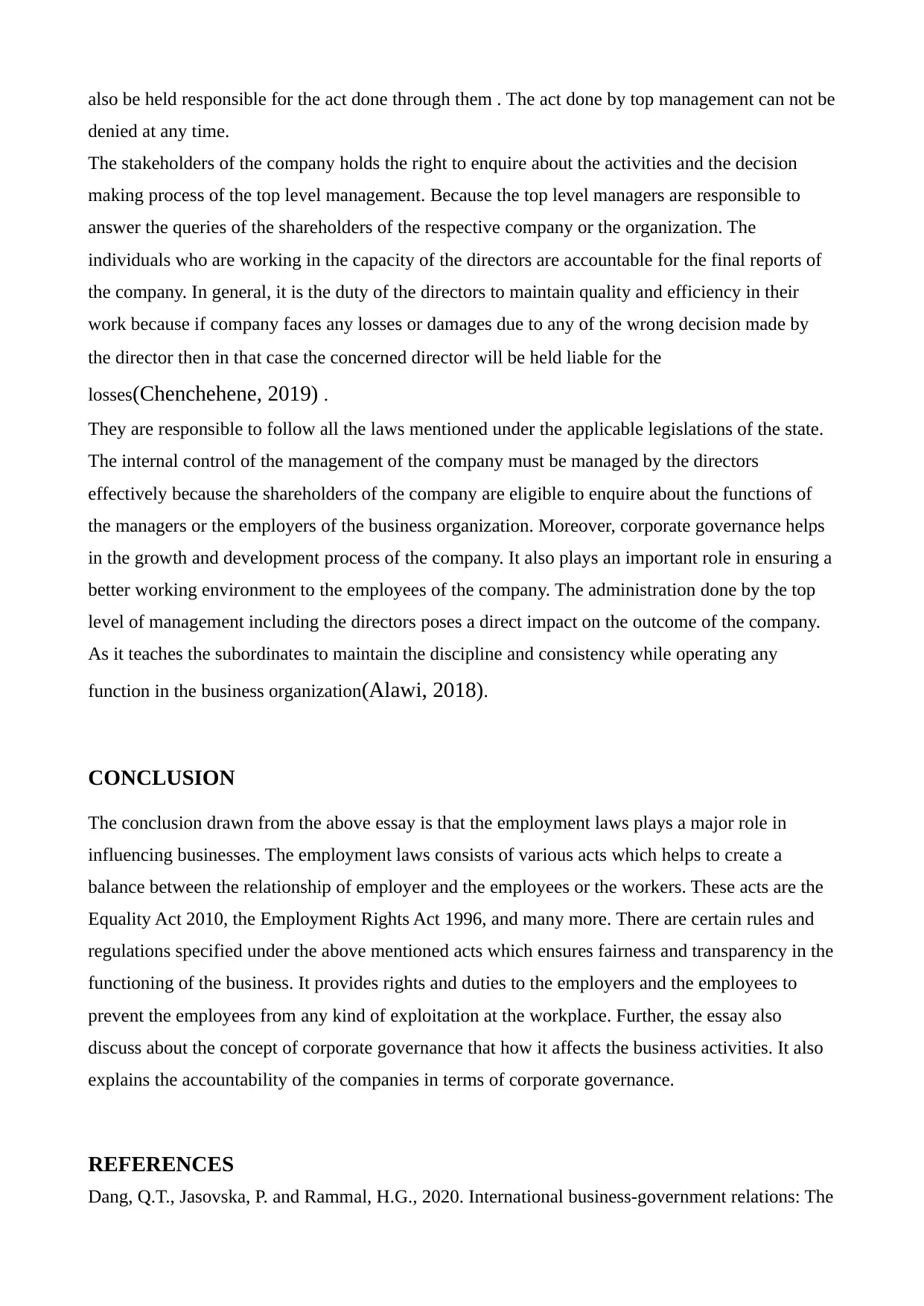
also be held responsible for the act done through them . The act done by top management can not be
denied at any time.
The stakeholders of the company holds the right to enquire about the activities and the decision
making process of the top level management. Because the top level managers are responsible to
answer the queries of the shareholders of the respective company or the organization. The
individuals who are working in the capacity of the directors are accountable for the final reports of
the company. In general, it is the duty of the directors to maintain quality and efficiency in their
work because if company faces any losses or damages due to any of the wrong decision made by
the director then in that case the concerned director will be held liable for the
losses(Chenchehene, 2019) .
They are responsible to follow all the laws mentioned under the applicable legislations of the state.
The internal control of the management of the company must be managed by the directors
effectively because the shareholders of the company are eligible to enquire about the functions of
the managers or the employers of the business organization. Moreover, corporate governance helps
in the growth and development process of the company. It also plays an important role in ensuring a
better working environment to the employees of the company. The administration done by the top
level of management including the directors poses a direct impact on the outcome of the company.
As it teaches the subordinates to maintain the discipline and consistency while operating any
function in the business organization(Alawi, 2018).
CONCLUSION
The conclusion drawn from the above essay is that the employment laws plays a major role in
influencing businesses. The employment laws consists of various acts which helps to create a
balance between the relationship of employer and the employees or the workers. These acts are the
Equality Act 2010, the Employment Rights Act 1996, and many more. There are certain rules and
regulations specified under the above mentioned acts which ensures fairness and transparency in the
functioning of the business. It provides rights and duties to the employers and the employees to
prevent the employees from any kind of exploitation at the workplace. Further, the essay also
discuss about the concept of corporate governance that how it affects the business activities. It also
explains the accountability of the companies in terms of corporate governance.
REFERENCES
Dang, Q.T., Jasovska, P. and Rammal, H.G., 2020. International business-government relations: The
denied at any time.
The stakeholders of the company holds the right to enquire about the activities and the decision
making process of the top level management. Because the top level managers are responsible to
answer the queries of the shareholders of the respective company or the organization. The
individuals who are working in the capacity of the directors are accountable for the final reports of
the company. In general, it is the duty of the directors to maintain quality and efficiency in their
work because if company faces any losses or damages due to any of the wrong decision made by
the director then in that case the concerned director will be held liable for the
losses(Chenchehene, 2019) .
They are responsible to follow all the laws mentioned under the applicable legislations of the state.
The internal control of the management of the company must be managed by the directors
effectively because the shareholders of the company are eligible to enquire about the functions of
the managers or the employers of the business organization. Moreover, corporate governance helps
in the growth and development process of the company. It also plays an important role in ensuring a
better working environment to the employees of the company. The administration done by the top
level of management including the directors poses a direct impact on the outcome of the company.
As it teaches the subordinates to maintain the discipline and consistency while operating any
function in the business organization(Alawi, 2018).
CONCLUSION
The conclusion drawn from the above essay is that the employment laws plays a major role in
influencing businesses. The employment laws consists of various acts which helps to create a
balance between the relationship of employer and the employees or the workers. These acts are the
Equality Act 2010, the Employment Rights Act 1996, and many more. There are certain rules and
regulations specified under the above mentioned acts which ensures fairness and transparency in the
functioning of the business. It provides rights and duties to the employers and the employees to
prevent the employees from any kind of exploitation at the workplace. Further, the essay also
discuss about the concept of corporate governance that how it affects the business activities. It also
explains the accountability of the companies in terms of corporate governance.
REFERENCES
Dang, Q.T., Jasovska, P. and Rammal, H.G., 2020. International business-government relations: The
Paraphrase This Document
Need a fresh take? Get an instant paraphrase of this document with our AI Paraphraser
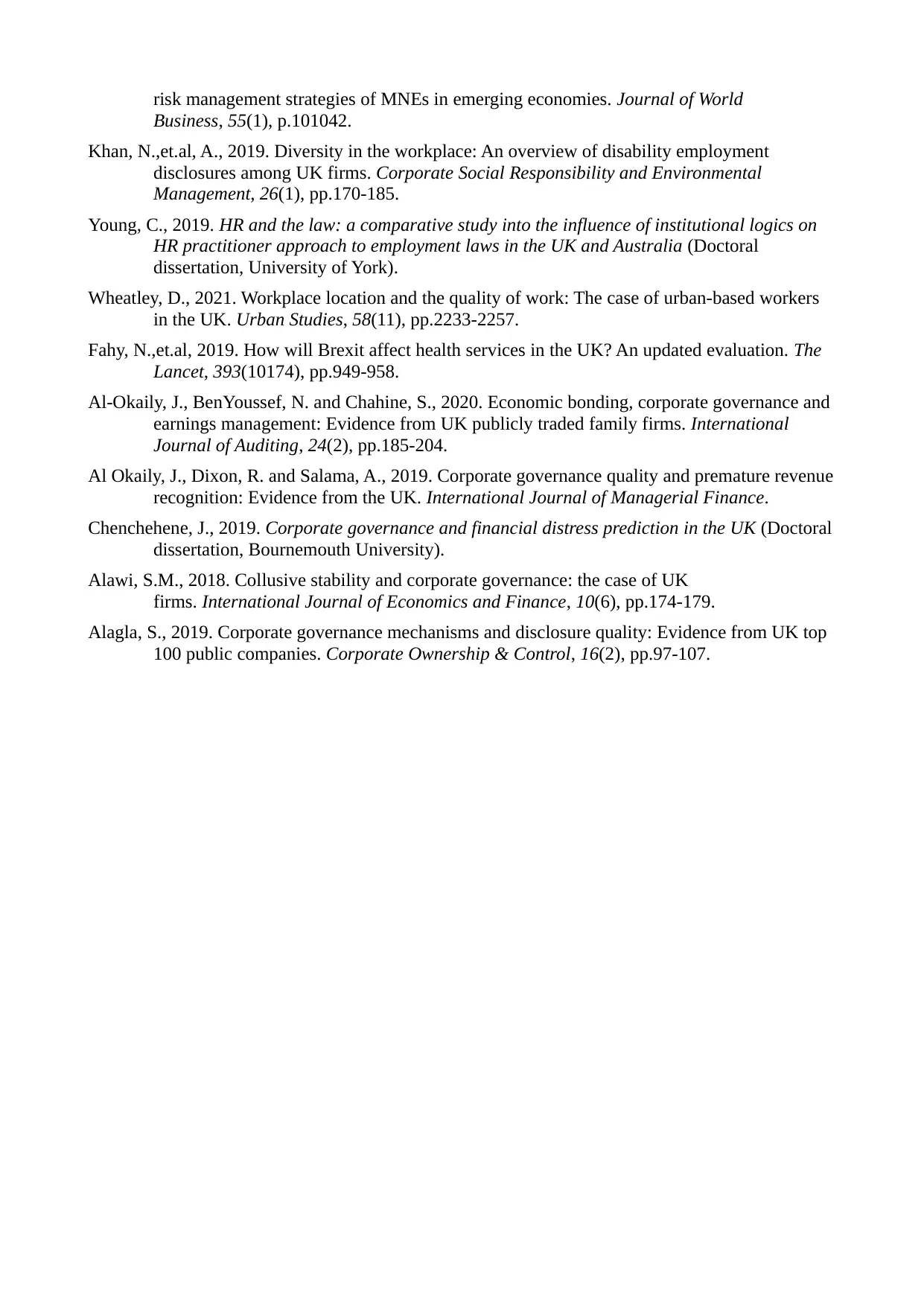
risk management strategies of MNEs in emerging economies. Journal of World
Business, 55(1), p.101042.
Khan, N.,et.al, A., 2019. Diversity in the workplace: An overview of disability employment
disclosures among UK firms. Corporate Social Responsibility and Environmental
Management, 26(1), pp.170-185.
Young, C., 2019. HR and the law: a comparative study into the influence of institutional logics on
HR practitioner approach to employment laws in the UK and Australia (Doctoral
dissertation, University of York).
Wheatley, D., 2021. Workplace location and the quality of work: The case of urban-based workers
in the UK. Urban Studies, 58(11), pp.2233-2257.
Fahy, N.,et.al, 2019. How will Brexit affect health services in the UK? An updated evaluation. The
Lancet, 393(10174), pp.949-958.
Al‐Okaily, J., BenYoussef, N. and Chahine, S., 2020. Economic bonding, corporate governance and
earnings management: Evidence from UK publicly traded family firms. International
Journal of Auditing, 24(2), pp.185-204.
Al Okaily, J., Dixon, R. and Salama, A., 2019. Corporate governance quality and premature revenue
recognition: Evidence from the UK. International Journal of Managerial Finance.
Chenchehene, J., 2019. Corporate governance and financial distress prediction in the UK (Doctoral
dissertation, Bournemouth University).
Alawi, S.M., 2018. Collusive stability and corporate governance: the case of UK
firms. International Journal of Economics and Finance, 10(6), pp.174-179.
Alagla, S., 2019. Corporate governance mechanisms and disclosure quality: Evidence from UK top
100 public companies. Corporate Ownership & Control, 16(2), pp.97-107.
Business, 55(1), p.101042.
Khan, N.,et.al, A., 2019. Diversity in the workplace: An overview of disability employment
disclosures among UK firms. Corporate Social Responsibility and Environmental
Management, 26(1), pp.170-185.
Young, C., 2019. HR and the law: a comparative study into the influence of institutional logics on
HR practitioner approach to employment laws in the UK and Australia (Doctoral
dissertation, University of York).
Wheatley, D., 2021. Workplace location and the quality of work: The case of urban-based workers
in the UK. Urban Studies, 58(11), pp.2233-2257.
Fahy, N.,et.al, 2019. How will Brexit affect health services in the UK? An updated evaluation. The
Lancet, 393(10174), pp.949-958.
Al‐Okaily, J., BenYoussef, N. and Chahine, S., 2020. Economic bonding, corporate governance and
earnings management: Evidence from UK publicly traded family firms. International
Journal of Auditing, 24(2), pp.185-204.
Al Okaily, J., Dixon, R. and Salama, A., 2019. Corporate governance quality and premature revenue
recognition: Evidence from the UK. International Journal of Managerial Finance.
Chenchehene, J., 2019. Corporate governance and financial distress prediction in the UK (Doctoral
dissertation, Bournemouth University).
Alawi, S.M., 2018. Collusive stability and corporate governance: the case of UK
firms. International Journal of Economics and Finance, 10(6), pp.174-179.
Alagla, S., 2019. Corporate governance mechanisms and disclosure quality: Evidence from UK top
100 public companies. Corporate Ownership & Control, 16(2), pp.97-107.
1 out of 8
Related Documents
Your All-in-One AI-Powered Toolkit for Academic Success.
+13062052269
info@desklib.com
Available 24*7 on WhatsApp / Email
![[object Object]](/_next/static/media/star-bottom.7253800d.svg)
Unlock your academic potential
Copyright © 2020–2026 A2Z Services. All Rights Reserved. Developed and managed by ZUCOL.



